#ifigenia so like
Text
hi. hey.
i hope y'all are doing well. didn't plan on posting a fic for a while, but this one has been growing in my head non-stop for two days, so here we are! i hope you aren't tired of post-season 2 angst just yet because that's what this is. big surprise, i know.
drunk crowley is always a joy to write, he does have a tendency to get rather dramatic and overly emotional; absolutely lovely. if you're wondering about the angel phones—they work exactly the way crowley and aziraphale think they do, as most of their belongings.
as always, a big thank you to @sentientsky for putting up with all the angst flowing out of me.
over the still world, a bird calls
Summary:
There are many things Crowley could have done once he returned to a cold, empty flat with a broken heart and the desire to get absolutely wasted, like taking a century-long nap or watching Golden Girls re-runs until he eventually passes out on his sofa.
Instead, after several bottles of wine, he picks up the phone and calls the only & last person he ever wants to talk to.
tag list under the cut
@ineffabledeathtoallmetatrons @ineffablymanic
@violet-prism-creatively @wraithee @underlined-in-spirit
@acheemient @queer4cryptids @aroaceblackhole
@six-of-snakes @im-the-son-of-rage-and-lov3 @adverbian
@oboextra @demonic-mnemonic @eybefioro @aq-uatic
@khlara @ifigenia-in-aulide @thetigersrise @littlelodell
@weasleywrinkles @eevee436 @ineffabledeathtoallmetatrons
@aydracz
#alex writes good omens#good omens#crowley#aziraphale#good omens season 2#go2#aziracrow#crowley x aziraphale#ineffable husbands#ineffable wives#ineffable spouses#ineffable divorce#the final fifteen#good omens ficlet#good omens fic#good omens fanfiction#good omens angst
79 notes
·
View notes
Text
Alright, I just started my first adventure into fanfic after my boyfriend tricked me into this fandom about half a year ago.
I have wanted to try to write for a while but didn't really know how to do anything that would feel like mine enough, but then I got the idea to rewrite a Greek tragedy with the marauders-era characters.
So I present Now Farewell, My Beloved Light, a retelling of Euripides' Ifigenia in Aulis where Regulus Black takes the leading role.
17 notes
·
View notes
Text
I need you guys to stop lying and pretending like all Lanthimos' movies are some form of high art.
The guy is literally every greek film bro that went to cinema school.
I do believe he genuinely believes he is revolutionising and combining the greek mythos with modern philosophical ideas. A harsh critic of the fickle and contradictory human nature. But that's where the problem mostly lies. He's not in the slightest bit subtle.
His earlier stuff is seriously just a bunch of pretentious one liners masked as some big profound truth.
"oh you don't like a killing of a sacred deer bcs you don't get the original myth" like no. I get it. And I also know that the greek myth wasn't really a much about divine punishment as it was about facing the reality of your actions. Agamemnon didn't want to sacrifice his daughter to stop the punishment that fell upon them all, after he had killed the sacred deer. He is forced to do it after outside pressure, forced to move past his denial and recognize that it is his only way of atonement. And then the gods still ultimately decide to save Ifigenia because after all she was faultless in all this.
Making "the killing" a medical malpractice is honestly brilliant. Agamemnon hadn't known it was Artemis' sacred deer that he had killed. He only found out after his punishment had already begun. Colin's character hadn't meant to kill the man either, hadn't known of his identity either. But this is as far as the briliance goes.
It is a deeply dark story about a man's desperate attempt to escape fate, to find a loophole, but ultimately it falls flat cause there is not an ounce of sympathy for the characters. You can't feel anything for them or their struggle because they are , intentionally, written so uncannily. Most if not all of Lanthimos' characters really lack the human element.
And although I get the thought and it really does work for a story on human connections like 'the lobster ". The unnatural and completely "un-human" way the characters are portrait adds more layer, a greater punch. Honestly it's extremely well fitted and executed. But for "the killing of a sacred deer" a story whose point really is about the despair, the cruelty of actions and events one is far too powerless to prevent it's...well I think it's a pretty terrible execution.
"you don't like the lobster because you simply can't see the point" Yes it's about society, everything is, it's about forced intimacy, the fear of loneliness, societal pressure and they way we would rather lie to ourselves and our potential partner if it meant we won't be alone. It's about dating for the sake of dating, about children being reduced to nothing more that accessories. About the reactionary solitude, the loners being just as cruel as the hotel enforcing the same strict rules but at the opposite direction. (It doesn't even matter if that is the actual point of the movie because if I talk long enough with enough buzzwords, throw enough ideas at the wall, you'll believe I know exactly what I'm taking about.)
And it's still not really that good.
The premise falls flat. The macabre aspect of being turned into an animal, if you fail at forming a connection, the horrifying depersonalisation, dehumanising the characters is hardly explored.
Ok fine, it was just the premise, just to set the scene (arguably it's the most interesting part of the story, but I digress.)
It's all about human nature. Yes, but it's nothing more than a cynics caricature of it.
But you see the loners are treated like animals but we see how they function and enjoy mundane things like shampoo and going to the mall, and are actually human. Yes me playing with my barbies at 10 had more depth than that. On other news water is wet.
The humans are complex, and actually human and also just as bad as the other humans isn't deep enough of a point to make me watch 2 hours of a stagnant film, and endure like five separate dialogs about ass fucking and masturbation. And how you need a partner to protect you from being sexualy assaulted (like from whom, if that's the case why not just simply turn the entire male population into animals, they seem to have ways of procuring children out of thin air so that doesn't seem to be a problem)
"You can't ask things like that. It's about philosophy and human nature not mechanics plot holes" yes but they're still part of a rather drawn out movie.. if he didn't want me to comment on the plot wholes he should've made the film one hour shorter and avoided them all together.
Like I'll be honest what annoys me the most in his films is the way he forces you to watch these scenes that can only be described as pretentious if not outright bad, that are so meticulously woven into the story. How deep how profound all sex is rape, humanity is cruel and uncaring, detachment is the bain of our modern society. I'm going to add 50 one liners about ass fucking because then it's just about sex, depersonalised. It's really not deep at all.
Like I'm so sorry that not wanting to watch Colin Farrel fuck a woman cosplaying as a corpse multiple times in a movie makes me unappreciative of high cinema. But I guess it is what it is.
(That said, his newer stuff is getting better at keeping up the engagement and evoking more sympathy for the characters. There is far more space to connect to them. The ending of "The favourite" let me feel the despair, the hopeless and absolutely miserable situation the characters found themselves in at the end of the movie.)
#movie critique#movie analysis#yorgos lanthimos#the lobster#the killing of a sacred deer#the favourite#art critique#movie critic#philosophy#greek mythology#greek myth
17 notes
·
View notes
Text
so marsipan @whensunscollide tagged me in this !!! ILY MARS so im just gonna leave this under the cut and i tag anyone who wants 2 do this no pressure lov u all but also i tag all the groupchat pls Do This im thirsty!!!!!!!!!!!!!!!!!!
a - age: 17
b - biggest fear: mars said this before (mars i’m so sorry i’m stealing ur answer alkdfjkaljaf) but it’s definitely true for me, and that’d be being completely alone in the universe, which is always why when ppl ask me if id rather be immortal or not i’m like “nah i’ll pass” bc i am Not about to outlive the fuckening universe, and also, i’m pretty afraid of staplers when they’re being used by people who are not me, near me
c - current time: 20:58
d - drink you last had: i can’t remember if it was water or sour cherry juice 👌
e - every day starts with: existential dread
i’m kidding i wouldn’t even say that ironically i love being positive
e - every day starts with: me stretching until all my bones crack and a glass of water
f - favourite song: this is a very unfair question but lkdjfajdf probably blow your mind - dua lipa or put your records on - corinne bailey rae
OH!!! also agosto - alvaro soler and anything nelly furtado has ever touched
g - ghosts, are they real?: they sold me weed behind an arby’s how else would u explain it
h - hometown: athens
i - in love with: if y’all don’t already know the answer to that then i’m doing something very wrong
j - jealous of: a lot of things !!!! it’s my weak point, but i’m working on it
k - killed someone: only by accident
l - last time u cried: oh god i cry all the time on the CONSTANT, probably this morning????? i teared up over a HAIM video or sth im ridiculous
m - middle name: sofia and harikleia after my two grandmothers
n - number of siblings: 0 but i have a weird story abt this which i’ll divulge in the tags
o - one wish: being able to grant true, genuine happiness and contentment like glitter; easy to spread, impossible to get off - to others and to myself
p - person u last called/texted: ooh man it’s jari @etoile-kid
q - question you’re always asked: it’s usually food-related bc my grandma’s culture revolves entirely around her asking everyone what they wanna eat every 5 minutes she’s a sweetheart, or it’s gotta to do with the fact that i don’t eat meat like i get asked something about this almost daily it’s Making Me Done
r - reason to smile: freedom, books, flowers, and the moon
(also my friends and dippin’ dots)
s - song last sang: dream a little dream - doris day
t - time u woke up: around 10 but then i fell asleep until 1 screaming
v - vacation destination: i desperately wanna visit prague, or rome, but apart from that i just wanna spontaneously show up at all my friends’ doorsteps like whassup man haven’t seen u Ever
w - worst habit: encouraging myself to fall into a pit of self doubt
x - x-rays you’ve had: i’m pretty sure i’ve had some of my head done but i don’t remember those bc i was TEENY but other than that My Foot
y - your favourite foods: tabbouleh salad, sushi, chocolate chip cookies, pickles, bell peppers
z - zodiac sign: virgo sun, aquarius moon, cancer ascendant
#back to the sibling thing; it's a v weird story bc i don't have siblings but u know how u#sometimes have the feeling that ur not Alone in a room even if u are and ur like lol ghosts#well ive gotten this in a very specific way all my life constantly like oh yeah im not Alone right now and i always#ever since i was little; felt it like a brotherly thing??? idk if this makes sense#but i found out my dad's ex before meeting my mom had a miscarriage and it was a boy#and that when my dad was little he'd constantly see dreams that he'd have two kids; a boy and a girl; and he'd name one jason and the other#ifigenia so like#this is all very weirdly connected#ur invited to think this is bullshit btw i#don't exactl ybelieve this is the ghost of my unborn brother dasjkldjfja also bc i feel like babies that Aren't born like; their souls r#recycled so it's not likely for me anyway it's just a cool phenomenon#also my answer to R was an oscar wilde reference if u didn't catch that if u did hIGH FIVE LOVEu#tag thingies
2 notes
·
View notes
Text
The Carranzas's sobriquets pt3
Petronila Carranza de Narváez (1722-1799): la Cortesana

AKA, the member of the court
There was nothing Petronila hated more than Aboveground nobility, but she certainly appreciated their aesthetic and superficial way of life --after all, what she disliked was how riddled with politics they had become in her family.
Petronila lived as a resident of Versailles would. She went to party after party, busied herself with going shopping for ever the more lavish gowns, she was courted with multiple men at once (which may not have been something the humans her age were doing, not that she cared), and gossiped like there was no tomorrow. Truthfully, she was much like a Saz member of a royal European court, with only her libertine ways and insignia marking her as other.
--------------------
Antonia Carranza Fernández (1745-1814): la Ilustrada o la Afrancesada
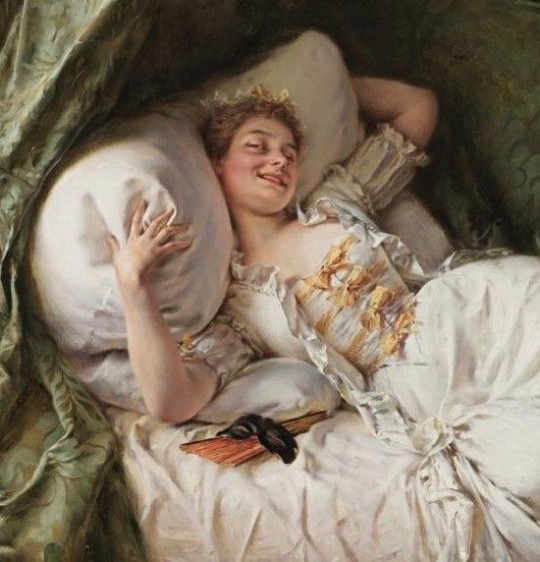
AKA, the enlightened or the frenchified
Antonia was perhaps the Carranza with the most faith in humanity. She lived at a time where the Enlightenment was gaining more and more power, and avidly encouraged it by owning a salon in Aboveground Madrid frequented by figures such as the Conde de Floridablanca or even Carlos III, whom she allegedly urged to shift Spain into a constitutional monarchy to no success.
When the War of Independence broke out, Antonia actually supported Napoleon's side. After all, she reasoned, Enlightenment and liberalism were already in Spain, there was no need to request another French king came back when the Frenchman there had created a constitution.
However, that didn't stop her from being terribly curious about the Constitution the Cortes de Cádiz was making, and was very pleasantly surprised to learn how progressive it was.
Rumour has it, that when Fernando VII was crowned king of Spain after the War of Independence was won and the Constitution of 1812 was ditched in favour of returning to absolutism, Antonia died out of sheer disgust.
--------------------
Cleofas Carranza Esquilache (1766-1936): la Cuenta Cuentos
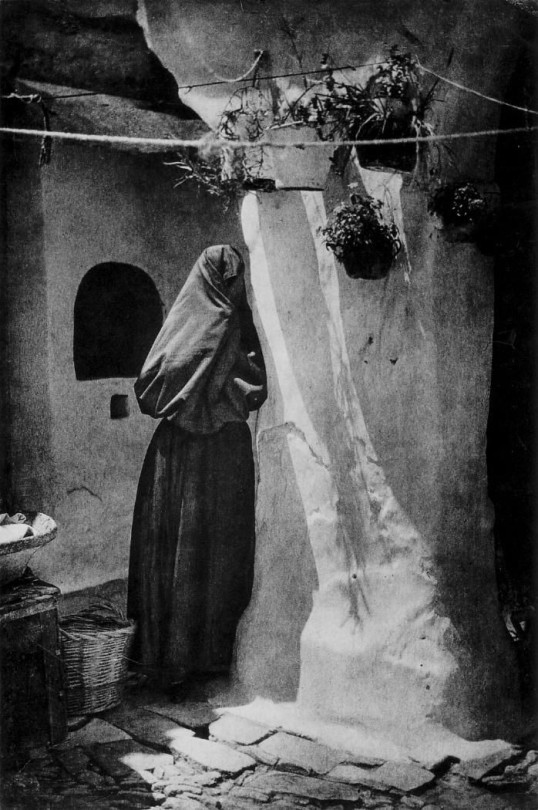
AKA, the storyteller
Cleofas never felt like dealing with humans approaching her for her crystal eye, so she dressed as a tapada de medio ojo and strolled through the streets of her village as if she were a ghost.
But Cleofas had a very macabre sense of humour, and so her desire to stay away from rude questions quickly morphed into a desire for doing mischief. She began standing next to shopkeepers, to whom she whispered 'you are standing on my tomb' in a frail tone; sitting by the elderly's side, taking their hands and whispering 'I know what you did'; and going to Church in the middle of mass to yell 'a sinner won't be able to cure you of your sins'. To the children, she liked to tell the stories she wrote and which the adults then used them to piece together the 'past' of the woman Cleofas had been when 'alive'.
The ominous whispering and yelling eventually stopped once Cleofas grew bored, but the storytelling continued. Soon she'd become a loving staple in the community, with the children and parents cherishing her stories of rotten princesses and murdered princes, and even making puppet plays out of them.
Once the Spanish Civil War started, the village became one of the first places to be raided by the fascists. The unorthodox, irreligious way in which it had evolved scandalised and quickly prompted them to kill the people that had become Cleofas's external family. Cleofas was so devastated, she asked to have her body de-cryogenised so that she could die. Her last words were: death and suffering belong in my stories, not in a country, not among siblings.
Tapadas de medio ojo/cobijadas were women who covered themselves in a black, thick veil that hid anything but the left eye. From what I've read, it could've originated from the times Muslims controlled a big portion of the peninsula, from the Spanish themselves or even from Jewish people. Also from what I've read, tapadas de medio ojo were seen with the most assiduity in the 17th century, and they usually were wealthy prostitutes or just women in general who wanted anonymity (though this later led to problems such as brothers thinking their sisters were someone they could have relations with). Cleofas isn't the only one who liked wearing the tapadas's veil --Dionisia, Urraca and others wore it as well-- but she was the one known for it because she refused to tread Aboveground with her face, thus prosthetic eye, uncovered.
--------------------
Ifigenia Carranza Esquilache (1802-1884): la Jueza o el Cuervo

AKA, the judge or the raven
Ifigenia had a reputation for being scary, even more so than her mother. She was ever-serious and surrounded by her unkindness of ravens, whom she adored as her pets and due to which the sobriquet 'the raven' was coined to refer to her.
Her other sobriquet, 'the judge', was a result of her accurate judgements of people and situations. If Ifigenia said someone was bad, then their evil was always, eventually, discovered; if Ifigenia said an earthquake would occur in two days, then two days later the ground would begin to shake.
Ifigenia was originally called 'the oracle', but she openly criticised that term. "I'm not an oracle who gets her information from the future through a magical source," she'd say, although she never revealed how she knew so much.
Only her mother Cleofas, to whom she was really close, knew said source: mathematics.
--------------------
Crespa Carranza de Lisón (1825-1902): la Titiritera
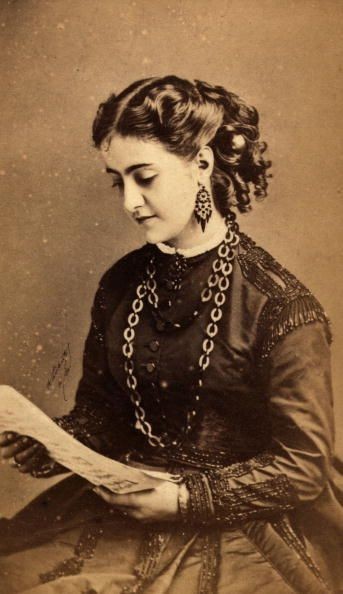
AKA the puppeteer
Crespa is one of the most intelligent Carranzas.
Born a woman in absolutist Spain, there was no hope for her to receive any education Aboveground other than in the Carranzas's own school-hid-as-convent, but Crespa refused to do so from a young age. Instead, she donned men's clothes and passed as a boy at a human school until she was fourteen --getting her Saz education in her free time-- and when she became fourteen, she resulted to using her male friends as a means through which enriching her knowledge.
To do that, she would hide in the classrooms's closets (sometimes even ceilings and floor) to hear the lessons, and fully take possession of her friend to answer the questions her teachers asked and voice any doubts she might have (something atypical of her). This took a lot of concentration and proficiency in her insignia, such a proficiency The Kinship had never before seen --therefore Crespa passed on to be known as simply 'the puppeteer'.
Her strategy was employed during university, and then during her job as a professor in the Universidad de Salamanca, but at that time, it was her husband (someone who was otherwise a househusband) who she controlled.
Crespa kept her strategy a secret from all but one human: Miguel de Unamuno*, who became her favourite author as well as her closest human friend later on in life.
*Nothing to say but I really fucking respect this guy. He thought for himself, he had the balls to tell the fascists they were wrong during an event he'd been invited to expressly to praise them during the Civil War, he admitted he was wrong in supporting them at the beginning of the war (the tags of this + the fact that the ii Republic was overall a mess are the explanation --Unamuno didn't sympathise with the fascists, and in fact was exiled in the 1920s because he openly criticised the proto-fascist dictatorship of the time).
--------------------
Gregoria Carranza Tresfuentes (1872-1931): la Libertina

AKA the libertine
Gregoria wasn't much for knowledge nor intellectual pleasure. She wanted to party, sleep with men without a care for respectability or consequences, read heated books and write even more heated letters to her many lovers, discard social conventions without a care, dress however she liked wherever and whenever she liked.
In all, everyone just agrees Gregoria was the pure embodiment of everything a libertine should be.
--------------------
Ifigenia Carranza de Ure (1892-1979): la del Destino de Desgracias

AKA the one with the destiny made of bad luck
The Kinship knows Ifigenia as the unluckiest Carranzas. She used to be a cheerful girl, then a loving wife, then a devoted mother to her three daughters, but the Spanish Civil War broke her happiness.
Ifigenia saw her family fall apart when her oldest daughters joined each one of the opposing bands and shrugged off their Saz identity. Ifigenia was the one who carried their bodies to their caskets, and then explained to her youngest daughter what had happened to her sisters.
After the Civil War, Ifigenia made it her mission to spread the news of what had happened across Mirror, to let everyone who would listen to her of the dangers of political extremism, populism, and the ideologies that ran rampant at the time. During World War II, she played a key role in the assembly of the Escuadrones Ajenos, that were a wide-scale project to try to save not only Saz, but humans as well, from the atrocities committed during the war. However, the Escuadrones Ajenos were discontinued after continuous failure to protect humans due to technical reasons and the actions of other humans*, thus marking yet another cause of distraught in Ifigenia's life.
Happiness was wrenched from Ifigenia in 1937, and she never gained it back until the General Franco died in November 1975: the month she lived more than him was probably the happiest time of her life.
*WWII was the most catastrophic war in history, and I can see why making fantasy a prominent element of it might not be the wisest thing to do. Let's just say that during military conflict, The Kinship just actively works towards aiding their own, because there are a fuck ton of Saz so that's a fit in and off itself and they don't want to know what the repercussions of Aboveground finding them out would be (eg #1: humans demonising them for being different and thus making Aboveground unsafe; eg #2: WWIII breaking loose because human governments want Mirror's natural resources or Saz to experiment with in order to artificially make humans Saz, so countries form alliances to attack Mirror a la Blitzkrieg or some shit, which would result in several million deaths; eg #3: a witch-hunt like situation happens within human governments because they think everyone is a potential Saz spy, and human governments going to shit = countries going to shit = the lives of the Saz living in those countries and with the humans from them going to shit). There are Saz that can have a more active role in wars, but they're not backed by the government, and if the actions they're going to carry out go fundamentally against other Saz (eg being a Nazi, because there are Jewish Saz who Hitler definitely thinks should be in concentration camps), they lose the ownership over their nationality and using their insignia --or any other Saz marker, including speaking Sazla-- is prohibited under risk of prosecutors killing you for it if humans find out about insignia.
--------------------
Eulalia Carranza Machado (1913-1939): la Apátrida o la Católica

AKA the stateless or the catholic
--------------------
Eulalia renounced of her Saz identity when she decided to join the self-named national band during the Spanish Civil War. She was known to have been pushed into the conflict following the start of the Red Terror, due to the impact the systemic persecution of the clergy had on her.
Leonor Carranza Machado (1915-1939): la Apátrida o la Roja
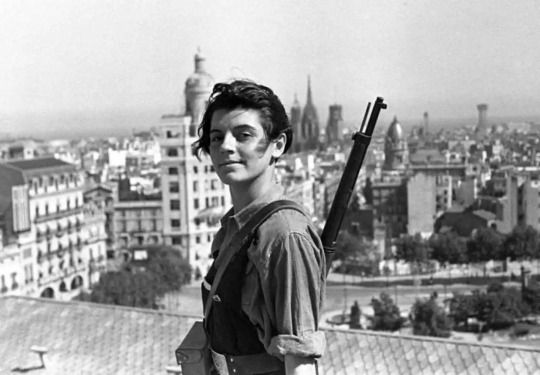
AKA the stateless or the roja
Much like her older sister, Leonor abandoned her Saz identity the moment she decided to take an active role in the republican side of the Spanish Civil War, becoming, thus, stateless. Many in Mirror also know her with the term 'roja', which was used as a derogatory term for left-leaning individuals.
--------------------
Matea Carranza Machado (1931-2016): la Buena Hermana
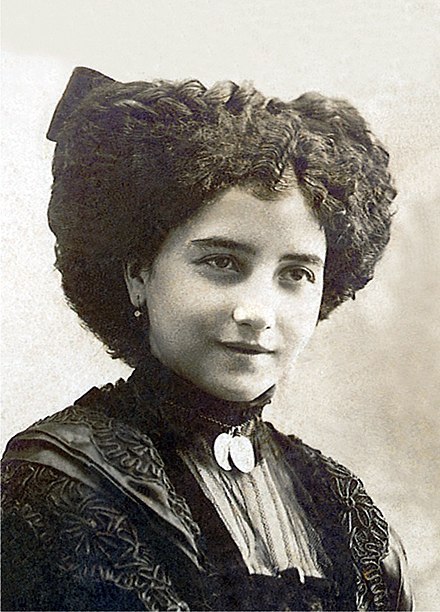
AKA the good sister
After Eulalia and Leonor turned their back on their country, the whole family turned to their younger sister, Matea, for hope. And Matea fulfilled their wish.
Matea's life was full of accomplishments, and yet she's remembered for the easiest --but most significant-- of them: being the better of the three Carranza Machado sisters.
#the kinship chronicles#am I putting my knowledge of history into good use?#yes yes I am#viva la pepa#nfidndisnwiwneiwwjwowndu honestly fuck fernando and his wife and his brother and all the silly absolutists who didn't want the constitution#*I* wouldn't want it rn because it's old but?#it abolished the inquisition? gave the people in the colonies the same rights as people in the peninsula? established spain as a democracy?#like I'd like to have maintained that constitution and not whatever the fuck was fernando and then his daughter's reign was#the constitution of 1869 can remain but the other four have no rights I hate it here#fernando and carlos should've died in bayona or something so that francisco de paula could reign#and *then* his gay politically-pliable son could've reigned next and then the cortes would have controled stuff and there would be democrac#democracy and then I'd have more info on the gay king's romance which tbh sounds nice because he only had one lover#en fin la hipotenusa#btw ifigenia was like a walking computer/algorithm/ya tu sabes#like mathematics could genuinely 'see the future' and she's the embodiment of that#btw clearly talking very little about leonor and eulalia because they have their own book lol
0 notes
Note
Hi I love your meta, especially the one about Aro's brain and Aro/Carlisle! What do you think is Carlisle’s draw to Aro?
Glad you like it! And that’s a great question.
(This is the post anon is referring to.)
Alright, so we can all in this fandom agree that Aro is a fan of Carlisle’s, to the point where we just take it for granted. Aro loves Carlisle because he loves Carlisle. (Insert joke here)
However, I haven’t seen any posts addressing why Aro likes Carlisle so much in the first place, so here’s my attempt to explain.
Before I start listing my reasons, though, I should clarify one thing - I do not see Aro as a heterosexual man, nor as someone who sees his marriage to Sulpicia as a monogamous thing. I mean, you have a beautiful man from Mycenaean Greece form a close friendship with another beautiful man, commission artists to immortalize his beautiful friend, they live together for decades- I’m getting ahead of myself. Point is, I think Aro is gay.
(And yes, I know that everyone on this site already knows that, but I am orderly. Also, I’ve seen people post “Aro has a crush on Carlisle” like that’s a hot take)
So, Carlisle. What about him makes Aro think he’s so great?
Carlisle is hot even by vampire standards
Frozen in his best age, tall, muscular, exotic eye color and with a hair color that has been considered desirable among many civilizations, the Ancient Greeks among them, Carlisle’s features would be considered ideal to a lot of people. More, he is so ridiculously beautiful that when Bella is awed by his beauty when she wakes up a vampire. The only other vampire to get that kind of reaction is Edward. Not even Rosalie, nor any of the Volturi or the guests who come in BD, get fawned over the way Bella fawns over Carlisle.
So, Mr. Hottie walks into Volterra, and I think that even if he’d been a himbo who couldn’t read Aro would still have tapped that. He wouldn’t have been invited to stay for several decades, though.
Carlisle is smart
Aro is a scholar who lives for knowledge, but finding someone who shares his interests is easier said than done. And even if he does find someone who likes arts and academics, they could still be an idiot. True intelligence is hard to come by. And then if he does find someone intelligent, what if they’re an ass? What if they’re boring?
Carlisle is a very intelligent man, ridiculously charming, and loves the academics so much that his first thought after deciding not to kill himself was “I’m going to study all the things!” Just, Carlisle, you absolute nerd. Aro must have squealed when he saw that brain.
Carlisle is a saint
99.9% of vampires drink human blood, rat blood drinker George is an outlier and should not have been counted. Seriously, though, when Carlisle woke up as a demon, he would have thought his soul to be forsaken already. He had nothing to lose by giving in and quenching his thirst, and yet he defied his newborn instinct to feed and tried to kill himself so he wouldn’t hurt anybody. There’s being a good person, and then there’s being the kind of person who’ll destroy themselves before they hurt others. I’m not going to get into all the ways in which Carlisle is a saint, that’s a post of its own.
What I’m getting at is that being beautiful is great, Aro’s tapping that. Being a nerd is also great, now Aro has a BFF. But Carlisle’s more than that. He’s a good person, the kind of good that’s daunting. And Aro can see his mind, see his every virtue and his incorruptibility. I think Carlisle rocked his world. I mean, he’s so impressed that the poor guard has been listening to him go on about how amazing Carlisle is nonstop for the past three hundred years. Jane thought he was exaggerating. Just... Carlisle’s wit and beauty was already great, but the whole saint thing appears to be what made Aro become the hardcore fanboy we meet in canon.
(I also think the whole “Stregoni Benefici” thing was at Aro’s behest or at the very least with his hearty approval. It happened in Italy, and on his own Carlisle is actually pretty damn good at keeping the secret. I strongly doubt something like inspiring his own myth could have happened without Aro’s involvement and consent. Caius, of course, cried)
The Didyme Factor
This one is really a post of its own, because boy do I have thoughts on Didyme. What I’ll say is this, from what we hear about Didyme she is reminiscent of Carlisle. An absolutely wonderful person, loved by all, her gift was to make everybody happy, she was so precious to Aro that he came back for her. And he ended up killing her. And since I don’t subscribe to Ever So Evil Aro, I think this was an Agamemnon and Ifigenia kind of situation where he sacrificed the thing he loved most for power, and now he has power but no sister.
The Didyme Factor isn’t so much one of the things that draws Aro to Carlisle, so much as it is something hanging over Aro and affecting his relationships.
So, these are my five cents on why Carlisle rocked Aro’s world.
#carlisle cullen#aro#aro/carlisle#twilight#twilight meta#twilight renaissance#in case it isn't clear - yes god i ship it#it's *the* ship for me in this fandom and i can't for the life of me understand why it's not more common#okay so it's not mainstream#but my other otp which is tom riddle/lily evans somehow has more fic on ao3 than this ship does#and tomlily is RARE rarepair#so it speaks volumes that this ship#pretty much the only lgb ship that is canon or semi-canon#(depending on how we define canon)#and it's passed over#not to mention it's a straight up good ship far more compelling than...#well i'm a shipper so i say it's more compelling than any other ship in this franchise#point being#this is a rarepair and it shouldn't be#i just don't get it#Anonymous#ask
420 notes
·
View notes
Photo


First foggy idea for Eddard Stark / Sean Bean and Cersei Lannister / Lena Headey fic
I had to do at least moodboard just to take it off of my mind - 3rd idea for the future on my list. I swore that I start a new fic after I’ll finish at least one ;)
Role verse - Honourable!Cersei & Political!Ned loosely based on characters of Queen Gorgo, king Leonidas wife from “300″ and Andromacha from “Troy” and Odysseus from “Troy”.
ActorsAU Jaime persuading Ned to play AT LEAST ONE GUY WHO DOESN”T DIE (”Fuck off, that is NOT TRUE!”) and mercilessly laughing at Cers’ crush on Ned
Writer/ArcheologistAU Beautiful, popular romance writer is challenged to or offended and just wants to write “something more serious” and ends up with the most insufferable archeologist ever: my historical-freak soul sings XD
AncientWesterosAU - this is all crazy and twisted, but here’s the idea:
I thought about some version of Troian War and Ned saving Cersei against all odds. Remember poor Andromacha, Hector’s wife? Their little child Astynaaks was killed (GRRM wasn’t so original with Elia, wasn’t he, huh?) and Andromacha became a slave and lover of Neptolemus, Achilles’ son, quite a bad guy in the end. I would like to use also one of the concepts of - originally redhead and left-handed - Odysseus story and I want him saving Andromacha. I was thinking also of “making her” Helen with Baratheon brothers as versions of Agammemnon and Menelaos. See this: Political!Robert killing his poor niece Shireen-Ifigenia for the sake of war and Stannis hidden hatred? What would Odysseus do, when asked for help in sacrificing an innocent girl? I’m affraid of writing it, because it could be too ridiculous, but I could still use this ideas in Writer/ArcheologistAU.
I’d love to know, what would you like to see?
Photos of actors from “Troy”and “300″; others are Greek vases with images of Hector and Andromacha with their child and a Greek soldier; this golden crown or hairnet is an artifact from ancient city discovered by H. Schliemann. This city could be Homer’s Troy, but myths and real events are mixed, as it happens often.
14 notes
·
View notes
Text
i had one look at @nightgoodomens post about them holding hands and the first time it might have happened and then i ended up with this idea rattling around my brain.
featuring aziraphale being a happy ray of sunshine and crowley falling into a gay and mildly horny panic because oh my god my crush is holding my hand.
nothing sweeter
Summary:
Aziraphale finds Crowley lurking around the Forum Romanum on a hot summer's day and pulls him along to try some new delicacies.
-
Without skipping a beat, Aziraphale glances over his shoulder with a giddy smile so radiant he can feel it in his soul, like a fragment of grace settling back into a space left empty for too long, and squeezes back, rattling off all the different kinds of wine he has already tried this week. Together, they weave through the crowds without problem, minor miracles bouncing around like a bag of marbles emptied over their heads to keep their path clear, and by the time they come to a stand, Aziraphale is mildly out of breath yet no less eager.
More importantly, even as he lists his orders at a speed fast enough to make the vendor dizzy, he does not loosen his hold on Crowley's hand, not for a single second.
tag list under the cut, tell me if you wanna be added/removed!
@ineffabledeathtoallmetatrons @ineffablymanic
@violet-prism-creatively @wraithee @underlined-in-spirit
@acheemient @queer4cryptids @aroaceblackhole
@six-of-snakes @im-the-son-of-rage-and-lov3 @adverbian
@oboextra @demonic-mnemonic @eybefioro @aq-uatic
@khlara @ifigenia-in-aulide @thetigersrise @littlelodell
@weasleywrinkles @eevee436 @ineffabledeathtoallmetatrons
#alex writes good omens#good omens#ineffable husbands#crowley#aziraphale#good omens season 2#go2#aziracrow#crowley x aziraphale#good omens fic#they like holding hands!!!!!!!!!!!!
101 notes
·
View notes
Text
Castro's conundrum: finding a post-communist model Cuba can follow
http://bit.ly/2vPfAGz
In Cuba, unlike in many Latin American countries, when you see children on the street, they're not begging; they're playing. And therein lies Castro's dilemma: how to reform Cuba's stagnant economy without losing what's working? Dan Lundberg/flickr, CC BY-SA
When US President Donald Trump imposed new restrictions on Cuba in June 2017, he professed his administration’s aim was to “encourage greater freedom for the Cuban people and economic interaction”.
Raúl Castro, who took over from his brother Fidel in 2008, has been trying to figure out that last part for years. In 2010, Castro spoke of the need to “update the economic model”, but the world has regrettably few models for a communist country in transition can follow.
As Rafael Hernandez, editor of the Cuban journal Temas, informed America’s National Public Radio in 2012, “a new model for Cuba is still taking shape, but it would be foolish for the island to try copying China or Vietnam”.
In both of these countries, but particularly in China, the transition to a market economy in recent decades has created gross economic inequality and come at a high social cost. Such outcomes would be unacceptable in Cuba, where the revolutionary spirit of egalitarianism lives on.
Cuba’s cuentapropistas
In the meantime, Castro is giving Cuba’s stagnant economy a cash injection by pursuing a simple premise: maintain state control of the economy but give the private sector more room for manoeuvre.
At the March 2011 Sixth Congress of the Cuban Communist Party, Castro spearheaded the approval of 300 historic measures to unlock the country’s entrepreneurial spirit, including reducing public sector jobs, decentralising the state apparatus and encouraging self-employment.
Rickshaw drivers are among Cuba’s burgeoning self-employed class. Antonio Castillo, Author provided
After a half-century of prohibition on where and how they could earn money, Cubans jumped at the opportunity to start their own small businesses.
Ramiro is one of them. “It was unbelievable, I took more than a hundred photos of Obama,” he told me on a crisp April afternoon while walking along the Malecón, the eight-kilometre esplanade along Havana’s north coast.
Barack Obama and his family landed at José Martí international airport in March 2016, the first US president to set foot on the island since Calvin Coolidge in 1928.
Ramiro, who sells churros in touristy Old Havana, is also a freelance photographer, and he followed the Obamas around the city, documenting their stay.
“Look at this one,” he said, showing me an image of the former president entering a restaurant with his wife and two daughters. “This is Obama when he went to have dinner at San Cristobal”, one of Cuba’s top-rated paladares, or private eateries.
“You should try the food there, you know Mick Jagger ate there, too?”
Tourism is the engine that fuels Havana’s upscale private eateries, called paladares. advencap/flickr, CC BY
The tourist engine
Ramiro’s recommendation is tongue-in-cheek: I can’t afford San Cristobal and he knows it.
Happily, there are more affordable options among Havana’s 1,700 paladares. These in-home restaurants are part of the new economic model that encourages cuentapropismo, or self-employment, in Cuba.
By the end of 2016, there were more than 535,000 cuentrapropistas on the island. Self-employment now represents 26% of non-state employment, and it is projected to rise to 35%.
Other than owning a paladar, Cuban entrepreneurs may now legally engage in 202 other private activities, including being an electrician, animal trainer, gardener, hairdresser, street vendor and rickshaw driver.
Tourism is the engine of this change. According to Cuba’s Ministry of Tourism, more than 4 million tourists are expected to land on the island in 2017.
US tourism has long been banned here, even under Barack Obama, so Americans must seek one of 12 specific licences to avoid violating US sanctions against Cuba.
Lester and Laura, a Catholic couple in their 60s, told me that they “came in under the religious activities” license, citing one reason Americans can get authorisation to travel Cuba.
Both schoolteachers, Lester and Laura were staying in an affordable casa particular (private home) on Old Havana’s Plaza Vieja. Like the paladares, these bed and breakfast-style accommodations are part of the cuentapropista economic plan.
The average host makes US$250 per booking, according to Fortune magazine – good money in a country where the average monthly salary is US$23. Business is clearly booming.
Jaime and Mario, the owners of the casa particular hosting Lester and Laura, have impeccably renovated the fourth floor of their six-floor apartment building, splitting it into two self-contained bedrooms.
They’d like to add a third, they told me, but navigating Cuban bureaucracy is as slow as dancing merengue. Approval to expand will take months.
An equitable society
Fidel Castro, who died in 2016 at the age of 90, remains a revered figure among Cubans. He is buried 800 kilometres from Havana, in the Santa Ifigenia cemetery in Santiago de Cuba, the birthplace of the Cuban revolution.
Don Raúl, a Santiagueño engineer who drives an unpainted 1954 Chevrolet, met me at the cemetery on one of those steamy, scorching Santiago mornings. He directed me to Fidel’s tomb (“Walk to the entry and then turn left”).
Fidel’s ashes are encased under a bulky granite boulder bearing a minimalist dark plaque engraved with just his first name. To pay respects to the legendary comandante, just as with so many things in Cuba from buying coffee to accessing the internet, one must queue.
Fidel Castro remains a hero for many Cubans. Antonio Castillo, Author provided
“Without Fidel we are heading to an unequal society,” Don Raúl told me. He is suspicious of cuentapropismo, which enriches some and leaves others out. “It’s not good.”
He doesn’t consider himself an entrepreneur. “I’m just a driver,” he said.
Don Raul, who still gets emotional when he speaks of Fidel, worries that Miguel Díaz-Canel, Raúl Castro’s designated successor, will push Cuba to become a “US-style country” when he takes the reins in 2018.
A girl, perhaps ten years old, leaves a bunch of red roses at Fidel’s tomb.
“He was a friend,” she told me. “He fought for the country and for the education of children.”
She’s onto something. Unlike elsewhere in Latin America, kids in Cuba don’t beg or sell candy on the streets. Education levels rival those of the developed world and childhood malnutrition is almost nonexistent.
These are key indicators of human development. Even in bad times, Cuba has been an equitable society. And herein lies the existential dilemma facing Castro (and, soon enough, Díaz-Canal): Cuba is poor, but it has also avoided many of the maladies facing its neighbours.
Raul Castro has described his vision for the country as “prosperous and sustainable socialism”. Now he just has to figure out what that looks like.
Antonio Castillo does not work for, consult, own shares in or receive funding from any company or organisation that would benefit from this article, and has disclosed no relevant affiliations beyond the academic appointment above.
0 notes
Text
The surveilled university
The surveilled university
MICHAEL H. MIRANDA | Fayetteville | 8 de Junio de 2017 - 09:33 CEST.
Last week several photos of American students with their professors
appeared on the social networks in Havana. The images would not have
drawn too much attention if it were not due to the fact that the
situation demands some wariness regarding the consumption of the
regime's iconography: the students were seen walking through the halls
of the Museum of the Revolution, in front of photos of Fidel Castro and
grotesque caricatures of American presidents. Their presence was also
noteworthy because in recent months there have been expulsions of
students and professors from Cuban universities, without many members of
American academia voicing any protest.
Considerable controversy has surrounded the idea of academic exchange
travel to countries that are not free. There is already an American
embassy in Havana, but relations are still far from normal, principally
because the Americans' demands for fundamental rights in Cuba continue
to be flouted by Havana. Following the rise of Barack Obama to the
presidency in 2008, it seemed that the possibility of systematic student
travel had finally been established, and several universities even
created a position specifically to manage these exchanges.
The question that many ask is whether public funds should be used to
organize trips whose itineraries, apparently approved at high levels of
the Cuban Government, include visits to sites "of historical and social
interest" (we already know what this means and the particular roadmap to
be followed), a route on which certain points on the strategic horizon
of tropical totalitarianism occupy a privileged place: if there are
museums like that of the Revolution full of photos of a Caribbean
tyrant, why not the family sanctuary in Birán (the Castros birthplace),
Fidel's stone at the Santa Ifigenia Cemetery, and the Museum of the
Ministry of the Interior, so well portrayed by Antonio José Ponte in La
fiesta vigilada?
The Cuban writer and former political prisoner Rafael Saumell, who
serves as a professor at Sam Houston State University in Texas,
appreciates the academic freedom that exists in the vast majority of
Western universities, but notes that he would never dedicate himself to
such a job. "Given the political pedigree of a few colleagues, there is
always the risk of using funds for indoctrination. The apologists for
diversity tend to be timorous in their censure of the expulsions of
professors and students who do not follow the Party line," he says.
It turns out that the aims of these trips could easily be questioned.
After all, the students could improve their Spanish and cultural
knowledge with less of an effort and sacrifice in the most
Mexican-influenced neighborhoods of Austin, Phoenix or Los Angeles. What
does the exhibition of a tank of the Rebel Army, a monument to Che
Guevara, or a visit to an independent dairy in Matanzas have to do with
the use of the subjunctive? Or is it a specific type of Spanish, one
that spurns its richest rules and elements, in favor of the impoverished
language found in the likes of Granma? At what point did American
universities, with the magnanimous (and even eager) assent of deans and
professors, decide that a lesson in normalization was in order, but only
while tiptoeing around their counterparts' recurrent breaches of
standards and violations of freedoms?
If American public universities do not know that in Cuba the expulsion
of students and professors who are not sympathetic to the regime is a
common practice, at least it could be said that they are uninformed. But
if they do know it, but still insist on signing collaboration agreements
with these institutions, they should expect revulsion and criticism for
using taxpayer funds to subject students to an agenda so distant from a
legitimate "cultural exchange" and so subservient to the Cuban
Government's political machinations.
Obama is history. Time may be running out on his policy of
normalization, while the regime erected by the Castros still stands, and
is hardly moving in the direction of open societies. We do not yet know
whether the Trump Administration will cancel or restrict these contacts.
What we can be sure of is that, if it does, American universities will
demand, vociferously and through every channel, their right to these
travel programs, and the uproar will only be comparable to their silence
and reticence to aid those subjected to the severe rigors of the other
university... the surveilled one.
Source: The surveilled university | Diario de Cuba -
http://ift.tt/2sG1vXO
via Blogger http://ift.tt/2sXjecp
0 notes
Text
I don't know how but every version of 1941 that i write ends up being more painful than the others. That's why we're all here though, pain, so enjoy!
love's the only witness (G, ~1.4k)
Summary:
They drift towards each other like they always do, and that one night in the middle of the Blitz, the walls separating them seem almost inconsequential. So Crowley hopes (like he always does), and the universe punishes him for it once again.
But this time he stays and asks the question neither of them can answer.
-
Pain is a friend, he can walk by its side if it means Aziraphale is on the other, he can bear hellfire and burning bookshops and the weight of time on his shoulders for him, always for him.
If only he would let him.
A tremor ripples through him when his hands remember the gun they held mere hours ago—traded for warm skin, traded for nothingness. So many words would have been left unspoken, and the regret of never getting to embrace Aziraphale even _once_ in his long, long life would have followed him all the way to hell.
@ineffabledeathtoallmetatrons @ineffablymanic
@violet-prism-creatively @wraithee @underlined-in-spirit
@acheemient @queer4cryptids @aroaceblackhole
@six-of-snakes @im-the-son-of-rage-and-lov3 @adverbian
@oboextra @demonic-mnemonic @eybefioro @aq-uatic
@khlara @ifigenia-in-aulide @thetigersrise @littlelodell
@weasleywrinkles @eevee436 @ineffabledeathtoallmetatrons
@aydracz
#alex writes good omens#good omens#crowley#aziraphale#good omens season 2#go2#aziracrow#crowley x aziraphale#ineffable husbands#ineffable wives#ineffable spouses#good omens 1941#1941 minisode#good omens fic
75 notes
·
View notes
Text
i've decided my new favourite kind of fix it is just the two of them having one single emotionally competent brain cell they save for emergencies like this one, so here we go!
light between the stitches
Summary:
Listen, he meant to say, do you hear that?
What comes out turns what was supposed to be a goodbye into a second chance instead.
@ineffabledeathtoallmetatrons @ineffablymanic
@violet-prism-creatively @wraithee @underlined-in-spirit
@acheemient @queer4cryptids @aroaceblackhole
@six-of-snakes @im-the-son-of-rage-and-lov3 @adverbian
@oboextra @demonic-mnemonic @eybefioro @aq-uatic
@khlara @ifigenia-in-aulide @thetigersrise @littlelodell
@weasleywrinkles @eevee436 @ineffabledeathtoallmetatrons
@aydracz
#alex writes good omens#good omens#crowley#aziraphale#good omens season 2#go2#aziracrow#crowley x aziraphale#ineffable husbands#ineffable wives#ineffable spouses#ineffable divorce#the final fifteen#good omens fic#good omens fanfic#good omens fic rec
50 notes
·
View notes
Text
so many happy endings lately, but not to worry, i fixed it!
a small story about the inherent eroticism of swords and the inevitability of fate
checkmate (G, ~1k)
Summary:
Aziraphale goes to heaven, Crowley goes to hell, and they end up making their relationship issues everyone's problem.
(But give them some time and they will figure it out.)
~
If there was one thing the Prince of Hell and the Supreme Archangel could agree on, it was that, under no circumstances, earth was to be used as a battleground.
They find each other like they always do, a sphere of silent space encompassing them, and when they lift their arms, it is reflex as much as it is the beginning of a love confession millennia in the making.
@ineffabledeathtoallmetatrons @ineffablymanic
@violet-prism-creatively @wraithee @underlined-in-spirit
@acheemient @queer4cryptids @aroaceblackhole
@six-of-snakes @im-the-son-of-rage-and-lov3 @adverbian
@oboextra @demonic-mnemonic @eybefioro @aq-uatic
@khlara @ifigenia-in-aulide @thetigersrise @littlelodell
@weasleywrinkles @eevee436 @ineffabledeathtoallmetatrons
@aydracz
#alex writes good omens#good omens#crowley#aziraphale#good omens season 2#go2#aziracrow#crowley x aziraphale#ineffable husbands#ineffable wives#ineffable spouses#ineffable divorce#the final fifteen#good omens fic rec
29 notes
·
View notes
Text
Fidel Castro is more of a presence in death than in recent life
Fidel Castro is more of a presence in death than in recent life
BY MIMI WHITEFIELD
[email protected]
Two months after the remains of former Cuban leader Fidel Castro were
laid to rest, his voice and thoughts continue to resonate from beyond
the grave.
Castro, via events in his honor and retrospectives, still makes an
almost daily appearance on the front page of Granma, the Communist Party
newspaper. After the recent end of the long-standing policy of allowing
Cubans to enter the U.S. without visas, his thoughts on independence and
self-determination were even included in the Cuban government's Jan. 12
immigration declaration.
This, despite his final wishes — according to brother Raúl Castro — that
he not did not want to be immortalized after death.
In recent years, Castro, who was 90 years old when he died and had been
in ill health since he stepped down from Cuba's presidency in 2006, had
made infrequent public appearances, although his written "Reflections"
still appeared in Granma from time to time.
"It doesn't surprise me that [Castro] might be more useful in death than
in life," said Ted Henken, a Baruch College sociologist who studies
Cuban society and entrepreneurship on the island. "They can trot out his
legacy to justify anything that leadership might decide."
A month after his Nov. 25 death — the cause still hasn't been disclosed
— Cuba's National Assembly of People's Power, its parliament, passed a
law that bans statues in Fidel Castro's image and the naming of streets,
plazas, buildings or other public sites in his honor.
But apparently, the law doesn't affect a huge neon Viva Fidel (Long Live
Fidel) sign atop a building along the Almendares River. It still shines
brightly every night and is clearly visible from the Malecón, Havana's
seawall and a popular gathering place. Thousands of billboards with
Castro's image and revolutionary slogans also are scattered all over the
country.
In a speech the night before his brother's ashes were interred in a
granite tomb at Santa Ifigenia Cemetery in Santiago de Cuba — the cradle
of the Cuban Revolution — Raúl Castro said that Fidel did not want to be
immortalized with statues or have anything named after him.
"The leader of the revolution rejected any manifestation of a cult
personality and was consistent with that through the last hours of his
life, insisting that once dead, his name and likeness would never be
used on institutions, streets, parks or other public sites, and that
busts, statues or other forms of tribute would not be erected," he said.
Castro's ashes reside in a granite tomb that says simply "Fidel," and
during the nine days of national mourning following his death, Cubans by
the thousands chanted "Yo Soy Fidel" (I am Fidel) as a caravan with
Castro's ashes moved across the country en route to Santiago.
"The mere fact that you can say Fidel and everyone knows who you are
talking about means there is already a personality cult," Henken said.
"All the fundamentals of a personality cult are already in place. I
guess they want to have their cake and eat it, too."
The legislation passed by the National Assembly bars the use of Fidel
Castro to "name institutions, plazas, parks, avenues, streets and other
public places, as well as any type of decoration, recognition or other
similar forms of homage."
Even though posters, key chains, magnets and T-shirts with revolutionary
hero Che Guevara's bereted image are available just about anywhere
tourist souvenirs are sold in Cuba, Castro's image is not to be sullied
by any publicity or commercial use.
The only exceptions allowed are the naming of an institution — some time
in the future — dedicated to the study of Castro's role in Cuban
history, and using Fidel Castro as the inspiration for art, music,
dance, literature or cinematic creations, according to the law.
It also notes that photos, portraits and images of Castro accumulated
during his "rich revolutionary trajectory" also may be displayed. That
means photos of Castro on display at Cuban workplaces will stay right
where they are — and so will the billboards.
"On presenting this law that honors the memory of our historic leader,
whom our people have elevated to immortality, we do this with the spirit
that his example. His work and his ideals will be eternal like the stone
where his ashes repose," Homero Acosta, the secretary of Cuba's Council
of State, said during the National Assembly meeting.
The caravan carrying Castro's ashes visited cities and small towns
across the island, following the reverse of the route from Santiago to
Havana that Cuban revolutionaries took on their victory march after the
Jan. 1, 1959, triumph of the revolution. But this month, there has been
a reprise of that reprise.
In early January, there was another re-enactment of the caravan
following the original Santiago-to-Havana route.
The caravans have served to reintroduce revolutionary ideals and make
them more immediate for members of the younger generation who often say
they're not interested in politics.
"The grandchildren and great grandchildren of the revolutionaries are
checked out on most political things," Henken said.
And the caravans have provided plenty of fodder for front-page stories
evoking the thoughts and words of Castro:
▪ After the caravan passed through Bayamo, there was a single word
headline in giant red letters stripped across the front page of the Jan.
3 edition of Granma. In a play on Fidel's name, it read simply Fidelidad
(Fidelity).
▪ On Jan. 7, there were three stories on the front page of Granma — two
about Fidel Castro and another about the weather. Granma reported that
in the month since Castro's burial, 70,000 people had visited his tomb.
The second story headlined "Fidel sigue regalando sueños" (Fidel keeps
making dreams come true) detailed the re-enactment of the passage of the
caravan on Jan. 6, 1959, through Cienfuegos, Santa Clara and Sancti
Spiritus.
▪ The Jan. 9 edition of Granma had just two stories on its front. One
was about the weather, and the lead story was a retrospective that
began: "A week after the Jan. 1 triumph, Fidel entered victorious into
Havana and history."
Source: Even in death, Fidel Castro casts shadow over Cuban society |
Miami Herald -
http://ift.tt/2jqU83Z
via Blogger http://ift.tt/2k7B37O
0 notes